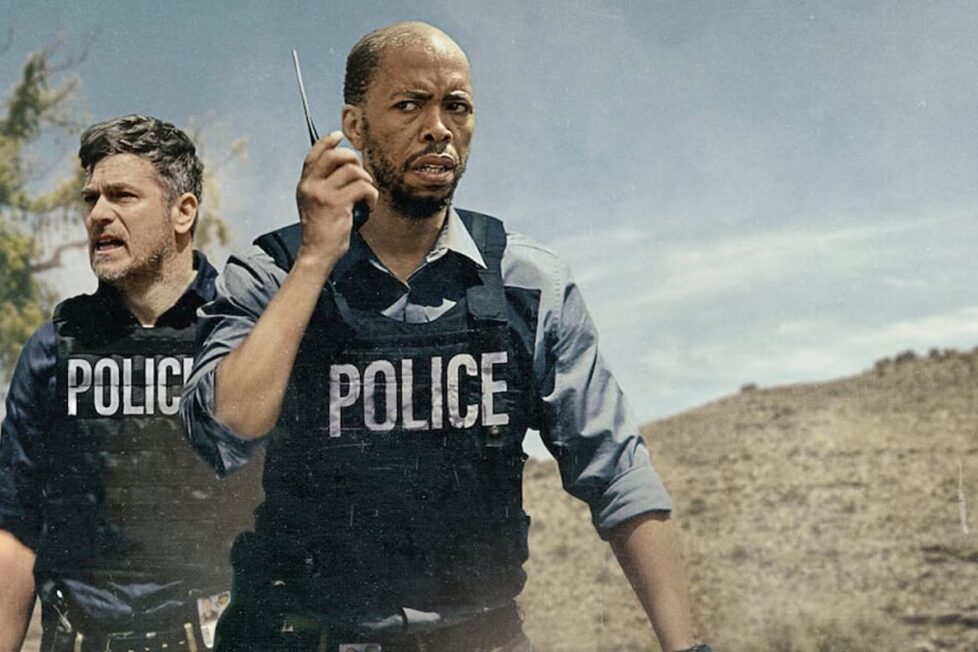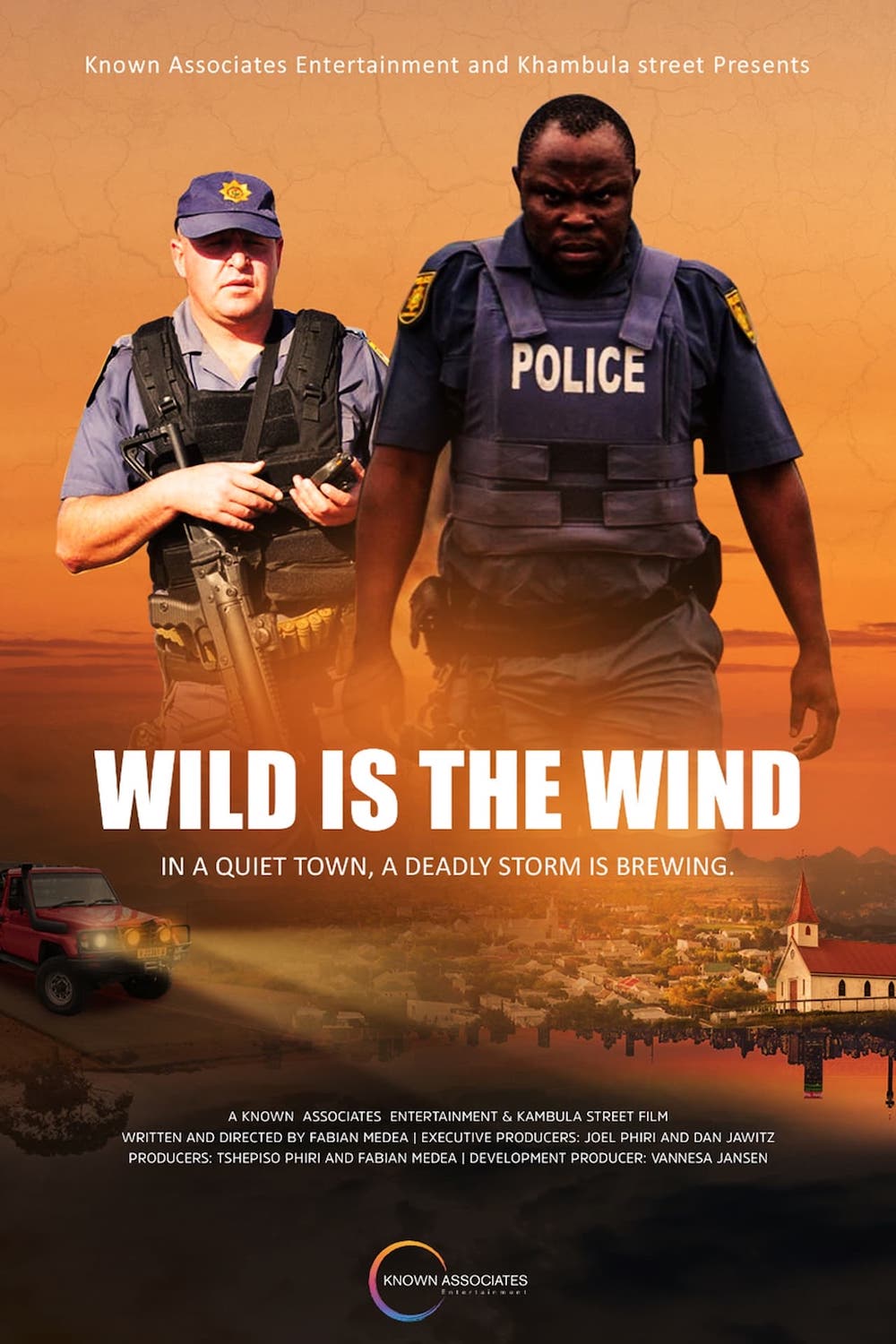WILD IS THE WIND (2022)
Racial tensions and corruption come to a head in a small, segregated town after the police find the body of a young Afrikaner girl in the bush.

Racial tensions and corruption come to a head in a small, segregated town after the police find the body of a young Afrikaner girl in the bush.


South African writer-director Fabian Medea’s debut feature may look, for a short while, like it’s going to be a serial-killer procedural, but it soon becomes apparent Wild is the Wind is more interested in its two detectives, their relationship, and the community in which they live than it is the crime and criminal which provide its pretext. Indeed, the killer seems to be identified in the first scene and that identification is confirmed soon afterwards, though the possibility of deliberate misdirection leaves a continued question mark over matters.
Wild is the Wind (the title comes from a Nina Simone song) takes place in a rural South African community where Vusi (Mothusi Magano) and his superior John (Frank Rautenbach) appear to shoulder most of the small police department’s responsibility for serious crimes. It’s they who are assigned to lead the investigation when a 17-year-old girl (the daughter of a local butcher and niece of the mayor) is found dead in the bush outside the town, and their attention naturally turns first to her abusive former boyfriend Hennie (David Viviers). When that leads nowhere, they focus instead on the young man she’s currently seeing (unbeknownst to her parents), small-time criminal Sonnyboy (Nicolus Moitoi).
At the same time, however, the two officers are also deep into a plan that means more to them personally: stealing a large hoard of drugs, selling it into the local underworld, and then using the money to fund their own urgent ambitions. For Vusi that means moving to Johannesburg, where he hopes to find a better life for his wife Abby (Mona Monyane) and the child they’re expecting; while for John, it means paying back overdue loans to a bank which will otherwise soon seize his property.
Neither of the detectives is exactly an upstanding ethical model, then, but—in a film that confidently permits much ambiguity in many of its characters—they’re not completely disinterested in doing the right thing either. The reward offered for apprehending the girl’s killer might be an added incentive, but they also have some genuine commitment to doing the job. At first, it’s John who seems to take it more seriously (Vusi observing that a black child’s murder would attract much less concern), but in time the reward money comes to dominate John’s thinking, while it’s Vusi who finds he can’t abandon his responsibility to deliver justice for the victim.
Race is fundamental to Wild is the Wind and one of its most striking scenes comes when the racial undertones of the previously pally John-Vusi relationship are at last laid bare, at least in Vusi’s perception. But the film’s treatment of it is thoughtful and it refuses to simplistically divide the community it portrays into ‘the oppressors’ and ‘the oppressed’.
For example, it’s clear that in this town the white people have more political power and more money (or at least more overt affluence) than the black people, but a flourishing, parallel black society is equally apparent; a young black man is aggressively and unjustifiably accused of the murder, but then so is a young white man. The picture Wild is the Wind appears to be putting forward is not so much one of oppression as of separation, of an unbridgeable gulf between the two racial groups. John, in one scene, wonders whether they can ever really come together.
Medea’s screenplay and direction keep things moving efficiently but never over-hastily. There’s enough time to explore Vusi and Abby’s relationship, the townspeople’s reaction to the murders, and the acute grief of the girl’s parents, and he uses the huge South African landscapes well to convey isolation, unchangeability, and, maybe, cruelty.
Though it’s perhaps more violent than it really needed to be (and on a couple of occasions horribly sadistic), given its generally pensive approach, the film’s only awkwardness lies at the end. Here, the climactic scene is given over to a confrontation with the serial killer (who up to then has seemed little more than a starting point for other plot elements), and in the course of it, he claims he’s collecting victims to provide him with slaves in the afterlife. This delusion is mostly associated with the Zodiac Killer in the US, to whom he bears no other resemblance, and like the whole scene it sticks out from the script like a sore thumb.
More than making up for this, however, is the acting throughout— perhaps the greatest strength of Wild is the Wind. Few of the cast will be familiar to viewers outside of their native land (though Magano appeared in 2021’s I Am All Girls, another effective South African crime tale on Netflix), but many even in small roles contribute to the film’s strong sense of plausibility.
Magano and Rautenbach are also outstanding as the two detectives, their friendship as convincing as the disagreements that emerge between them; they’re just enough alike, and just enough not alike. Equally well depicted is the relationship between Magano’s Vusi and Monyane’s Abby, another couple with strong bonds that are tested—if not quite broken—by the dangers that start to enmesh them.
Moitoi is terrific as Sonnyboy, all hardness and bravado on the surface but obviously vulnerable beneath, while Brendon Daniels as a local businessman and crime figure could almost be an older version of him. In smaller but still important roles Deon Coetzee, as the murdered girl’s father, and Michelle Douglas as her mother are another completely credible couple dealing with an awful thing in ways that reflect their very different natures.
While it gives none of them short shrift, Wild in the Wind is not able to explore these smaller characters as fully as you might like. But just as much as the two protagonists, they all add significantly to the texture of place and society that Medea creates, which bodes well for his next film.
SOUTH AFRICA | 2022 | 123 MINUTES | COLOUR | ENGLISH • AFRIKAANS • TSWANA • XHOSA


writer & director: Fabian Medea.
starring: Mothusi Magano, Frank Rautenbach, Chris Chameleon, Mona Monyane & Nicolus Moitoi.
